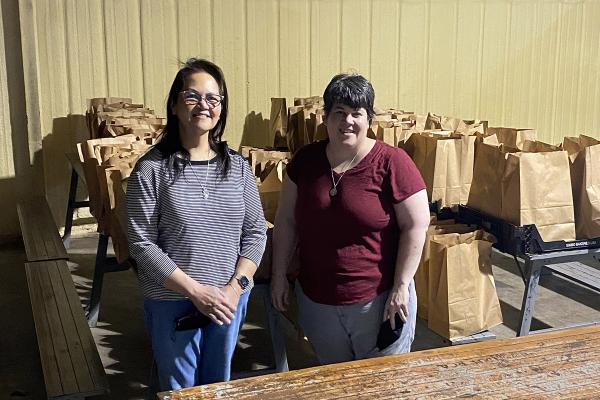
FORT SMITH — Sister Siena Fisk, OSB, volunteered on the Texas-Mexico border to better understand the plights of immigrants.
The Benedictine at St. Scholastica Monastery in Fort Smith volunteered at Eagle Pass, Texas, for eight days in January working with Mission: Border Hope, a migrant assistance program.
“Visiting and helping the migrants and better understanding their plight has long been my desire,” she said.
She traveled with Novice Dorothy Herring, OSB, of Mount St. Scholastica Monastery in Atchison, Kan., on mission with Caridad de Corazón, led by Sister Ursula Herrera, OSB. The Benedictine program works with other churches at Mission: Border Hope to respond to Jesus’ imperative to “welcome the stranger.” (Matthew 25:35)
Sister Siena said her eyes were opened when she served meals and distributed clothing to immigrants from Nicaragua, Cuba, Honduras, Haiti and Venezuela.
“The migrants arrived on buses from the border processing center,” she said, “and the first thing they did on arrival was to show their ‘papers,’ granting them temporary legal residence in the U.S. until their court dates. Most of them had been fed and had showers at the processing center. We helped them contact relatives and family members in different parts of the country, gave them hot meals or sack lunches and distributed clothing and shoes.”
Once the migrants knew their destinations, they got on buses to other cities and states while others traveled to the San Antonio airport to fly to where their family members could pick them up.
“Although migrants waiting for a decision on asylum are in the U.S. legally, they are not permitted to work, and so they need to have family and friends help them until their case is called,” Sister Siena said.
The only immigrants who enter the country illegally are those who cross the border and try to bypass the processing centers. Immigrants without temporary papers are deported immediately if apprehended, and Mission: Border Hope has no contact with them.
Sister Siena’s experience as an immigrant from the Philippines was quite different, although not without challenges.
“My older sister came to the U.S. as a nurse,” she said. “She sponsored my parents, and when my parents were able, they sponsored my brother and me. After five years, we were called to Manila, where we filled out immigrant applications and submitted medical and other information.”
The then-26-year-old arrived in the U.S. in 1996 with a degree in computer science.
“Although I saw a lot of poverty in the Philippines that was comparable to what I saw at the Mexican border, most Filipinos are highly educated with marketable skills. Because there is a lack of jobs for them in their home country, they need to immigrate,” she said.
With her parents’ sponsorship, Sister Siena and her brother could fly to the U.S., knowing they would get “green cards” and resume their careers. The immigrants she saw in Texas had a very different welcome.
“Immigrants have to file online for asylum, either in their own countries or in Mexico,” she said. “They save money for their trip, but much of their travel is on foot, and they are robbed along the way in almost every country they travel through. When they arrive at the U.S. border, having filed their initial application online, they are given a number and can’t go through secondary processing until their number is called. They live in tent cities in Mexico for as long as six months.”
The secondary screening they receive at the border ensures they don’t have criminal records or contagious diseases and can safely stay inside the U.S. until a court hearing determines if they are eligible for permanent residency, she said.
“When the migrants got off the bus at Mission: Border Hope, they looked tired but hopeful,” Sister Siena said. “They were looking for a better life for their families, and sometimes their children were with them.”
The sisters could also cross the border to minister to orphaned children and homebound disabled at Piedras Negras, Mexico. Seeing Caridad de Corazón’s ministry on both sides of the border gives Sister Siena hope.
“There is a monument at the border showing the U.S. and Mexico clutching hands,” she said. “To me, it represented not only the relationship between Mexico and the U.S. but also Caridad’s partnership with other Christian non-profits. It was touching to see how they worked together to help the marginalized and those most in need.”
Please read our Comments Policy before posting.
Article comments powered by Disqus Clergy blast Texas lawsuit targeting migrant ministry
Clergy blast Texas lawsuit targeting migrant ministry
 Sister Stephanie Schroeder was lifelong learner
Sister Stephanie Schroeder was lifelong learner
 U.S. bishop hails government’s refugee plan for 2024
U.S. bishop hails government’s refugee plan for 2024
 Mass and holy hour mark start of Respect Life Month
Mass and holy hour mark start of Respect Life Month
 'What's going to happen?': 'Dreamers' in legal limbo
'What's going to happen?': 'Dreamers' in legal limbo
 Don’t let misconceptions cause faith to waver
Don’t let misconceptions cause faith to waver
 Seniors, whatever storms may come, Jesus will be there
Seniors, whatever storms may come, Jesus will be there
 Studio 3:16 offers new approach to teaching religion
Studio 3:16 offers new approach to teaching religion
 After three decades, NLR principal plans to retire
After three decades, NLR principal plans to retire
 CHS athlete overcomes odds to reach collegiate goal
CHS athlete overcomes odds to reach collegiate goal
 St. Joseph a model of solidarity with immigrants
St. Joseph a model of solidarity with immigrants
 Two gifts after Jesus’ death: Virgin Mary and Eucharist
Two gifts after Jesus’ death: Virgin Mary and Eucharist
 Why we have an altar, and not just a communion table
Why we have an altar, and not just a communion table
 Pope: Wars should be resolved through nonviolence
Pope: Wars should be resolved through nonviolence
 Living relationship with Jesus Christ in the Eucharist
Living relationship with Jesus Christ in the Eucharist